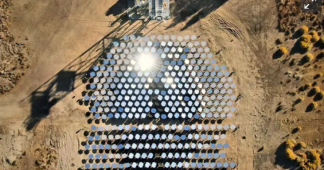By Richard Collett-White and Zak Derler
May 1, 2020
Climate science deniers and long-time opponents of renewable energy, many with ties to oil and gas companies, have seized on Michael Moore’s latest documentary to argue the case for continued fossil fuel dependence.
Planet of the Humans investigates the environmental footprint of renewable technologies such as wind, solar and biomass, and argues that the green movement has sold out to corporate interests. The documentary has been viewed over five million times on YouTube since its release last week to coincide with the 50th Anniversary of Earth Day.
But the film, produced by Moore and written and directed by his long-time collaborator Jeff Gibbs, has been widely criticised by energy and climate experts, who say it fails to provide context on the benefits of renewable energy and the negative impacts of fossil fuels, and is based on out-of-date information.
A group of environmentalists and climate scientists, including Professor of Atmospheric Science Michael Mann, who was this week elected to the National Academy of Sciences, has described the documentary as “shockingly misleading” and called for it to be withdrawn.
In contrast, the film has been heavily promoted in recent days by commentators known for their rejection of mainstream climate science and support for fossil fuels, including some with direct ties to the industry.
While the film’s anti-economic growth and population control message has not appealed much to the free-market philosophies of many of these commentators, its criticism of renewables struck a chord, with the narratives used generally taking one of three forms.
‘Renewables are ineffective and more damaging than fossil fuels and nuclear’
The US-based libertarian Heartland Institute, which hosts “counter-summits” alongside UN climate conferences and has taken funding from fossil fuel interests including oil major ExxonMobil, was quick to host a podcast episode dedicated to Moore’s documentary.
One of the Heartland employees contributing to the podcast praised it for doing a “really good job of ticking off all the downsides” to renewables, which he claimed were the “least efficient way that you can try to generate electricity”.
Another said the “green weenies” could have “learned all of this stuff about the folly of wind and solar” by “coming to Heartland Institute conferences and reading our website”.
Myron Ebell, Director of Energy and Environment at the free-market Competitive Enterprise Institute and a regular speaker at Heartland conferences, has written a blog lauding the film. In the article, since reposted by the UK-based climate science denial campaign group the Global Warming Policy Foundation, Ebell claims the film “exposes” every type of green energy as “phony, useless, and inextricably dependent on fossil fuel production and large-scale hardrock mining”.
Both Heartland and the Competitive Enterprise Institute, which has similarly received funding from Exxon and the Koch family, owners of the largest privately owned oil company in the US, have sought to pressure Donald Trump into removing the United States from the Paris Agreement on climate change action.
Environmental commentator and nuclear enthusiast Michael Shellenberger also reacted positively to Moore’s film, tweeting that it proves “renewables are worse for environment than fossil fuels”.
Major new documentary film produced by Michael Moore exposes
– why renewables are worse for environment than fossil fuels
– why green leaders promote them
– why everybody got it wrong
My latest @Forbes — please share!https://t.co/hBWfR23E5n
— Mike Shellenberger (@ShellenbergerMD) April 21, 2020
In a column for Forbes, he argued nuclear power was the only answer to our energy needs, stating that solar panels require more materials to build and create more waste than nuclear plants. While solar panels can create a certain amount of potentially hazardous waste, around 80% of a panel is recyclable and solutions are being developed for the remaining materials.
Later interviewed by Sky News Australia’s Andrew Bolt, who has been criticised for repeatedly dismissing mainstream climate science, Shellenberger claimed most countries would need to use roughly 50% of their land to produce 100% renewable energy. Many studies have found the figure to be considerably lower.
The far-right news website Breitbart similarly claimed the documentary reveals that the solar and wind industries “pretend to be saving the planet from climate change while consuming more fossil fuels than they save”, despite research showing their carbon footprint to be many times lower.
In the UK, pro-Trump commentator James Delingpole wrote on the same website that Moore’s documentary was the “most powerful, brutally honest and important documentary of his career”.
He said it “clearly shows that renewable energy is damaging to the landscape and to wildlife and does NOT reduce the use of fossil fuels”. He suggested it could help Trump win the upcoming US election because it “undermines the entire basis of the Green New Deal” advocated by some Democrats. Elsewhere, Delingpole has called Moore his “new hero” and praised the film for “causing greenie heads to explode”
I highly recommend the new @mmflint documentary. It is causing greenie heads to explode https://t.co/YHMeo1brQh #batchompingbirdslicingecocrucifixes
— Professor Dr Sir James Delingpole OM QC (@JamesDelingpole) April 24, 2020
Breitbart News, whose UK branch Delingpole edits, was co-founded by Steve Bannon, former White House Chief Strategist for Donald Trump, and board member of scandal-hit political consultancy Cambridge Analytica. Breitbart and Cambridge Analytica were both financially backed by long-standing funders of climate science denial, the Mercer Family.
Matt Ridley, an author and former chairman of the Northern Rock bank, whose collapse precipitated the 2008 financial crash in the UK, has also applauded Planet of the Humans for being “extremely critical of the green renewable energy industry, saying it’s just as industrial as the fossil fuel industry, in fact it’s dependent on it”.
Speaking in a webinar organised by the British Conservation Alliance, a student network that describes itself as the “home of conservative climate solutions”, Ridley, who has a coal mine on his family estate, said you “simply cannot run a modern economy on wind or solar because there just isn’t enough space for putting up the panels or the windmills. And there isn’t enough resources.”
‘Renewable energy is a profit-driven scam and the environmental movement is corrupt’
These groups and individuals have also used the film to promote the narrative that renewable energy is a scam, backed by crony capitalists colluding with environmentalists.
In his blog about the film, the Competitive Enterprise Institute’s Myron Ebell called it a “stunning evisceration of so-called green energy and the people profiting from it”.
Moore’s documentary was also the subject of an interview by the Canadian far-right news site Rebel News with Marc Morano, Communications Director of CFACT, a Washington-based free-market think tank that has claimed carbon dioxide is a “harmless trace essential gas in the atmosphere”.
Morano called Planet of the Humans an “amazing film” during the interview with host Ezra Levant, with the only downside being that Moore “believes in climate alarmism severely”.
Asked by Rebel News host Ezra Levant whether Moore produced the documentary because “he hated the fact these billionaires were tricking everyone”, Morano said the filmmaker “sees all the con that they’re doing and who’s profiting and who’s making money”. CFACT has taken funding from ExxonMobil and billionaire industrialists the Koch brothers.
A similar narrative was used by Robert Bradley Jr, founder of the Koch-funded Institute for Energy Research, when pre-release screenings of the documentary took place last summer.
In a blog post, Bradley said that the documentary had put the “alternative-energy lobby” on notice. The blog was subsequently reposted by Natural Gas Now, a pro-fracking website based in Pennsylvania. Its owner Tom Shepstone, who described renewables as “mostly a hedge-fund scam” in an introduction to the post, is a former employee of Energy in Depth, a PR campaign launched by the Independent Petroleum Association of America to promote fracking, with funding from oil majors including Shell, BP and Chevron.
In Australia, Sky News’ Andrew Bolt highlighted a scene from the documentary showing corporate executives awkwardly trying to explain where the energy for the electric vehicles they were promoting was coming from.
Bolt assured viewers he didn’t agree with many of the points the film makes, but nonetheless claimed “all this effort of green power, all this expense, is for next to nothing”, despite studies repeatedly finding that electric vehicles reduce emissions even in heavily coal-dependent power grids
Another presenter on the same channel, Rowan Dean, similarly described renewables as a “hoax”.
In Canada, Terence Corcoran, comment editor for the Financial Post section of the Toronto-based National Post, said Moore’s film showed green energy was a “giant capitalist fraud” and should be the “hottest doc of the year”.
Corcoran has previously dismissed warnings about climate change from the UN and downplayed threats the Arctic, criticising the “sensational language in the media and elsewhere that implies the Arctic is heading into some kind of oblivion. A changing Canadian Arctic might even be good.”
In the UK, James Delingpole wrote on Breitbart that renewables were “a monstrous, dirty, ugly scam, orchestrated by a cynical few at the expense of the many”, while Andrew Montford, Deputy Director of the Global Warming Policy Foundation, tweeted that the documentary showed “the green movement is just a way to make a few dishonest capitalists very rich. Greens have been lying to everyone for 25 years”. The GWPF refuses to disclose its sources of funding, but has been revealed to be bankrolled by a number of wealthy donors, many of which financially supported the UK’s pro-Brexit campaign, including billionaire hedge fund manager Michael Hintze and currency trader Neil Record.
‘Environmentalists are now trying to cover up the truth’
Following the call from some environmentalists to have the film removed, opponents of climate action have since accused them of censorship.
The GWPF’s Montford tweeted in response: “You know the Michael Moore film is right about renewables because the greens are trying to have it taken down rather than arguing their case. Just as they always do”.
Another GWPF employee, Harry Wilkinson, Head of Policy at the organisation’s campaign wing, tweeted: “This is a classic. The Guardian endorse censoring a film exposing the environmental consequences of renewables, labelling it ‘full of misinformation’. But fail to identify a single inaccurate fact in the documentary.”
This is a classic. The Guardian endorse censoring a film exposing the environmental consequences of renewables, labelling it 'full of misinformation'. But fail to identify a single inaccurate fact in the documentary.https://t.co/wwJQpzQOGo
— Harry Wilkinson (@HarryWilkinsonn) April 29, 2020
The letter, organised by the director of the anti-fracking documentary Gasland, Josh Fox, and co-signed by climate scientist Michael Mann among others, said Moore’s film “trades in debunked fossil fuel industry talking points” and “ignores the last ten years of peer-reviewed renewable energy planning and policy”.
In the US, an article on the film in the Daily Caller, founded by Fox News host Tucker Carlson and majority funded by the Charles Koch Foundation, reported that climate activists had failed to “browbeat” the Films for Action website, which is hosting the documentary in addition to YouTube, into taking down the film. The article was reposted by the popular climate science denial blog, Watts Up With That?
Sky News Austrlia’s Chris Kenny also hinted that Australia’s public broadcaster ABC was deliberately burying the film, stating: “it seems the ABC has forgotten about Mike Moore and this film. Last I checked they hadn’t reported on it at all. It seems to present too many inconvenient truths.”
The ABC was widely praised for its coverage of the Australian wildfires at the beginning of the 2020, while Rupert Murdoch’s News Corp, which owns Sky News Australia, was criticised for its “irresponsible” coverage of the fires. Murdoch’s son James said he was “disappointed” with the media company’s climate science denial and a News Corp employee resigned saying she could no longer work for an organisation that she claimed was running a “misinformation campaign” around the wildfires.
Criticism of the film
- Dana Nuccitelli, Yale Climate Connections: “Michael Moore’s ‘Planet of the Humans’ documentary peddles dangerous climate denial”
- Ketan Joshi: “Planet of the humans: A reheated mess of lazy, old myths”
- Leah C. Stokes, Vox: “Michael Moore produced a film about climate change that’s a gift to Big Oil”
- Dan Gearino, Inside Climate News: “Inside Clean Energy: 6 Things Michael Moore’s ‘Planet of the Humans’ Gets Wrong”
- Brian Kahn, Gizmodo: “Planet of the Humans Comes This Close to Actually Getting the Real Problem, Then Goes Full Ecofascism”
- A Siegel, Get Energy Smart Now: “Planet of The Humans: An Annotated Collection“











